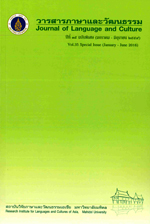Keep your virginity to be a good Thai girl: The impacts of sexual identity from state sexual education programs
Main Article Content
Abstract
This research study is a health and physical education curriculum of the Basic Education of 2008, which studies the concept of Thailand in its attitudes and violent symbolic reflection on sex education provide to teenagers. Discourse on sex education became a tool used to determine the state of gender behavior. The state agreed to give public practice, but deprived of the sexuality of the individual. The problem is that many people are unable to follow this ideal image in today’s modern society. The state’s concept has yet to be updated to match the current state of society. Thailand’s current public policy on sex education contradicts the realities of today’s modern sexual relationships. This creates an environment of inequality, as allows valuable human beings to be unjustly convicted of sexual discourse with men and women separated clearly. The discourse that provides value to the traditional concept of male and female sexuality, also cultivates an exclusionary attitude that has prescribed limitations on certain groups, such as homosexuals, and does allow any opportunity of acceptance for these groups within Thai society.
Article Details
The articles featured in the Journal of Language and Culture (JLC) constitute academic works representing the viewpoints of the respective author(s). It is crucial to note that these opinions do not necessarily reflect those of the Editorial Board.
All articles published in JLC are released under the Creative Commons Attribution 4.0 International License (CC BY 4.0). This license grants permission for unrestricted use, distribution, and reproduction in any medium, provided proper credit is given to the original author(s) and the source.
References
Fraser, N. (2003). Social justice in the age of identity politics: Redistribution, recognition, and participation. In Redistribution or Recognition? A PoliticalPhilosophical Exchange. New York: Verso.
Rubin, G. S. (2011). Thinking sex. A Gayle Rubin Reader Deviations, 137-181.
Peter A. J., (1997). “Thai research on male homosexuality and transgenderism and the cultural limits of foucaultian analysis”.Journal of the History of Sexuality 8(11), (pp.52-85).


